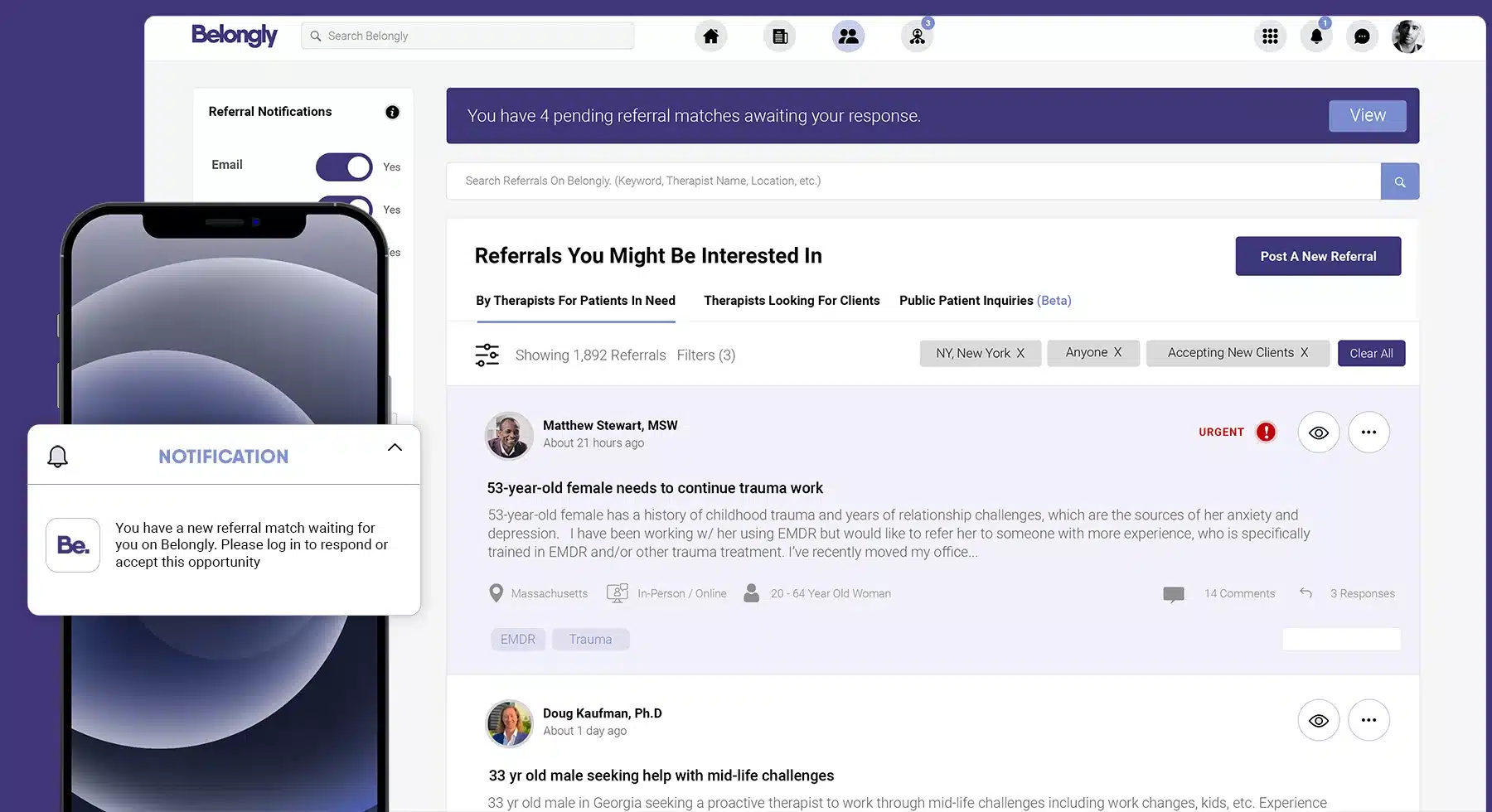What do you value most about your work as a therapist? Chances are, it’s not paperwork, billing, scheduling, and other administrative duties. We therapists are passionate about helping our clients, but administrative tasks? Decidedly less inspiring.
According to a recent Belongly survey, the average therapist spends 20 percent of the workweek doing administrative work. In a 40-hour week, that’s equivalent to 8 hours! Imagine what you could do with those hours if they weren’t consumed by administrative drudgery.
Excess admin time isn’t just annoying and time-consuming. The hours and energy consumed by these tasks detract from patient care. Some therapists are forced to shorten session times so that they can write notes, answer new patient inquiries, and submit claims. Others designate certain hours of the week for paperwork and billing. Either way, more admin time means fewer clinical hours available, which can lead to longer waitlists.
There is a better way to handle the administrative side of being a therapist, and it doesn’t necessitate hiring full-time help. The tools outlined in this post can help you automate tasks and improve efficiency, benefitting you, your practice, and your patients.
Practice Management Systems
Practice management systems are programs that help therapists manage various aspects of their practice, such as scheduling, documentation, billing and invoicing, and data analytics. These systems not only save time but also can improve quality of care by providing insights into treatment progress. Some even assist with marketing, helping new therapists to grow their caseloads.
Systems vary in terms of features, customizability, and price points. Here are the pros and cons of some of the most common practice management systems:
SimplePractice
Pros
- Highly flexible and customizable
- A comprehensive library of forms and other useful documents
- More marketing features than some other systems– for example, a professional website and online directory
Cons
- Complicated price structure
- Expensive
- Privacy concerns (the company collects aggregated, anonymized client data but maintains HIPAA compliance)
- Better suited for large practices
Bottom line: Best for the therapist or group practice who doesn’t mind paying extra for premium features.
TheraNest
Pros
- Pricing is based on caseload, making it ideal for smaller practices or therapists who are just starting out
- Customer service includes 1:1 support
- Offers useful additional content like client resources and business guides
Cons
- Forms and templates are limited and difficult to customize
- Billing systems are outdated and unintuitive
Bottom line: Best for therapists with small caseloads who already outsource billing.
TherapyAppointment
Pros
- Created by therapists
- Pricing based on caseload
- Doesn’t restrict features
- Automated insurance claims
- More affordable than many alternatives
Cons
- Not as customizable as other platforms
- Telehealth requires an extra fee
Bottom line: Best for therapists looking for a lot of features at an affordable price.
Counsol
Pros
- Highly customizable, allows you to maintain brand consistency by matching forms with your website, logo, and other marketing materials
- Comes with a personal account manager for 1:1 support
- Excellent customer service
- Includes client journal feature
Cons
- Some features cost extra (e.g., integration with Wiley Treatment Planners)
- No pre-generated forms– everything must be customized
- The calendar isn’t flexible across time zones
- Limited to 5 practitioners
Bottom line: For tech novices who enjoy hands-on support.
Billing/Insurance
Billing mistakes can lead to delayed reimbursement and unhappy clients, ultimately affecting your reputation and bottom line. These billing systems can help you save time, improve insurance compliance, and reduce claim submission errors:
Office Ally
Pros
- Lots of features– e.g., eligibility checks, documentation, scheduling
- Free and paid versions
Cons
- Some applications are not as integrated as they could be
- Some features cost extra– e.g., appointment reminders
- Server congestion is a concern
- No mobile app
Bottom Line: For therapists who are looking for a low-cost claims clearinghouse and don’t require mobile compatibility.
Apex EDI
Pros
- Integrates seamlessly with Theranest, since both systems are owned by Therapybrands.com.
- 95% payer acceptance rate
- 60-day money-back guarantee
Cons
- Less reliable for complicated claims
- Reviews of customer service are mixed
Bottom Line: For Theranest users and therapists with straightforward claims.
Documentation
Hate writing progress notes? There are now AI-based tools that record and/or summarize sessions for you, saving countless hours, improving insurance compliance, and allowing you to focus on clients instead of note-taking.
Mentalyc
Pros
- Easy to use
- Integrates with other EHRs
- Select from a library of default templates or build your own
- Data analytics to help improve client outcomes
Cons
- Limits you to a certain number of notes per month based on the plan you select
- More expensive than other options
Bottom Line: For therapists who don’t mind paying extra for the ability to record and analyze sessions.
Behavioral Health Notes
Pros
- Created by a team of clinical psychologists, tech experts, and healthcare professionals
- Free trial with no credit card required
- Annual or monthly plans are available
- Includes client worksheets and a treatment plan library
Cons
- Limited to 80 notes per month
- No option for dictation or session recording– therapists must input session details and shorthand notes
Bottom Line: For part-time therapists with patients who prefer not to be recorded.
Auto Notes
Pros
- More affordable than other plans
- Unlimited progress notes
- Does not store any patient information
Cons
- Treatment plans are limited to one per month unless you purchase the Pro plan
- No option for recording sessions
Bottom Line: For therapists looking for a low-cost dictation service to cut down on documentation time.
Keep Reading
Want more? Here are some other blog posts you might be interested in.









